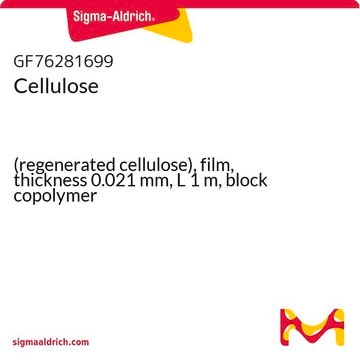22182
Cellulose Chromatography Resin
acid washed, from spruce, 100-700 mesh
Sinonimo/i:
Cellulose powder, Cotton linters
About This Item
Prodotti consigliati
product name
Cellulose, acid washed, from spruce, for column chromatography
Origine biologica
spruce
Livello qualitativo
Grado
for column chromatography
Forma fisica
powder
Qualità
acid washed
tecniche
LPLC: suitable
Lungh. fibre
0.02-0.15 mm
Impurezze
≤0.05% ether extract
Residuo alla calcinazione
~0.01%
Matrice
Cellulose
Gruppo funzionale matrice
polymer
Dimensione particelle
20-150 μm
Cationi in tracce
Cu: ≤5 mg/kg
Fe: ≤10 mg/kg
Tecnica di separazione
size exclusion (SEC)
InChI
1S/C12H22O11/c13-1-3-5(15)6(16)9(19)12(22-3)23-10-4(2-14)21-11(20)8(18)7(10)17/h3-20H,1-2H2/t3?,4?,5?,6?,7?,8?,9?,10-,11?,12+/m1/s1
GUBGYTABKSRVRQ-WFVLMXAXSA-N
Cerchi prodotti simili? Visita Guida al confronto tra prodotti
Descrizione generale
Applicazioni
Codice della classe di stoccaggio
11 - Combustible Solids
Classe di pericolosità dell'acqua (WGK)
WGK 1
Punto d’infiammabilità (°F)
Not applicable
Punto d’infiammabilità (°C)
Not applicable
Dispositivi di protezione individuale
Eyeshields, Gloves, type N95 (US)
Choose from one of the most recent versions:
Possiedi già questo prodotto?
I documenti relativi ai prodotti acquistati recentemente sono disponibili nell’Archivio dei documenti.
I clienti hanno visto anche
Il team dei nostri ricercatori vanta grande esperienza in tutte le aree della ricerca quali Life Science, scienza dei materiali, sintesi chimica, cromatografia, discipline analitiche, ecc..
Contatta l'Assistenza Tecnica.
